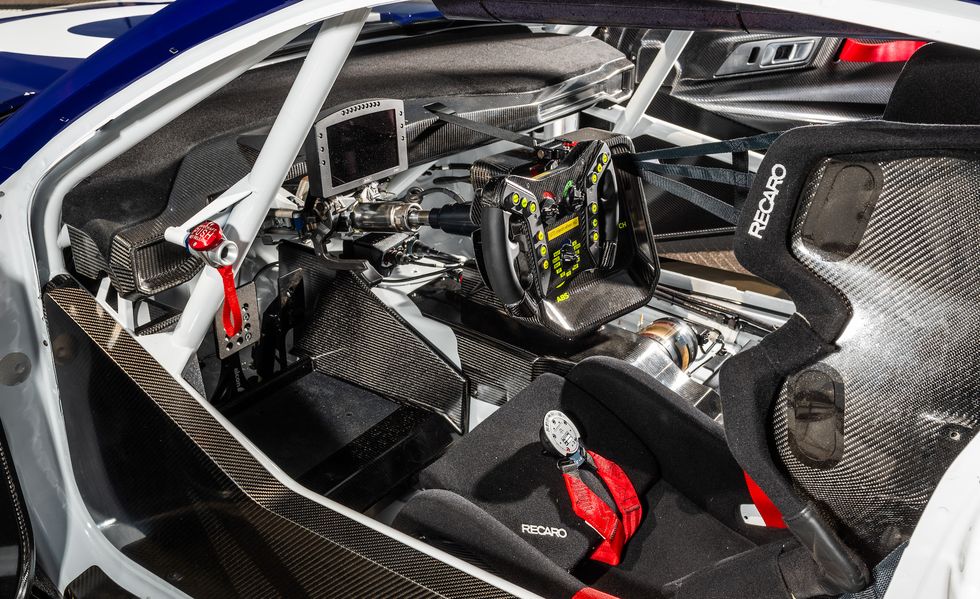- Based on the 2024 Ford Mustang Dark Horse, the GT3 version is a factory-backed race car.
- Along with a race-tuned 5.4-liter V-8 and unique suspension, the Mustang GT3 features carbon-fiber body panels and extreme aero bits like its huge rear wing.
- Ford says the GT3-spec Stang will start competing around the globe next year, with entries in the 2024 World Endurance Championship and the 24 Hours of Le Mans.
The Ford Mustang GT3 is what happens when the new V-8-powered Dark Horse model is transformed from a badass street car into a full-blown race car. Making its debut today on the eve of this year’s historic 24 Hours of Le Mans, Ford says it is officially entering the Mustang in the global FIA GT3 category.
Ready to Race
This time next year, the factory-backed Mustang GT3 will compete in the 24 Hours of Le Mans. But that’s after it’ll compete in other racing series starting earlier in 2024. Among those are the World Endurance Championship and IMSA’s GTD Pro Class. The former series will see two entries by Ford’s first customer team, Proton Competition out of Germany. The latter will feature a pair of entries from Ford Performance’s factory team, which will be managed by Multimatic Motorsports and kicks off at the 2024 Rolex 24 at Daytona.
Ford Performance had help developing the GT3 Mustang from a couple longtime partners. Multimatic will help build and support the race cars, while M-Sport will build the engines, which are race-tuned 5.4-liter V-8s based on the new 5.0-liter Coyote engine that develops 500 horsepower on the Mustang the Dark Horse. Other upgrades on the GT3 variant include a rear-mounted transaxle and a unique suspension that uses an unequal-length double-wishbone setup.
Show Pony
Wearing a flashy livery by Troy Lee, who is said to rank among the top motorsport designers, the GT3-spec Stang also showcases Ford Performance’s fresh logo. The simplified design will be plastered on all of FP’s racing creations, advertisements, and you name it.
Beneath that colorful wrapper are a whole lot of carbon-fiber body panels. There’s no mistaking the GT3 variant for anything other than a Mustang, but its appearance is significantly altered. All four fenders balloon out, making it much wider. There are myriad cutouts for improved airflow and cooling too.
Its face is positively menacing, with exposed carbon fiber surrounding the lower front air intake. Above are a set of fog lights to better illuminate the track during nighttime racing and in situations with poor visibility. Out back there’s an enormous swan-neck wing that sprouts from the sloping roofline rather than the decklid. The protruding rear diffuser also looks like it could sever a limb or two.
Inside, the Mustang GT3 looks nothing like its street-legal counterpart—okay, the door handles are familiar. It’s otherwise stripped down for maximum weight reduction, fitted with a roll cage for improved rigidity and safety, and there’s a single Recaro racing seat facing a steering wheel that seemingly has more buttons and switches than Volkswagen’s entire lineup of electric vehicles.
This content is imported from poll. You may be able to find the same content in another format, or you may be able to find more information, at their web site.
Senior Editor
Eric Stafford’s automobile addiction began before he could walk, and it has fueled his passion to write news, reviews, and more for Car and Driver since 2016. His aspiration growing up was to become a millionaire with a Jay Leno–like car collection. Apparently, getting rich is harder than social-media influencers make it seem, so he avoided financial success entirely to become an automotive journalist and drive new cars for a living. After earning a journalism degree at Central Michigan University and working at a daily newspaper, the years of basically burning money on failed project cars and lemon-flavored jalopies finally paid off when Car and Driver hired him. His garage currently includes a 2010 Acura RDX, a manual ’97 Chevy Camaro Z/28, and a ’90 Honda CRX Si.
Read the full article here




